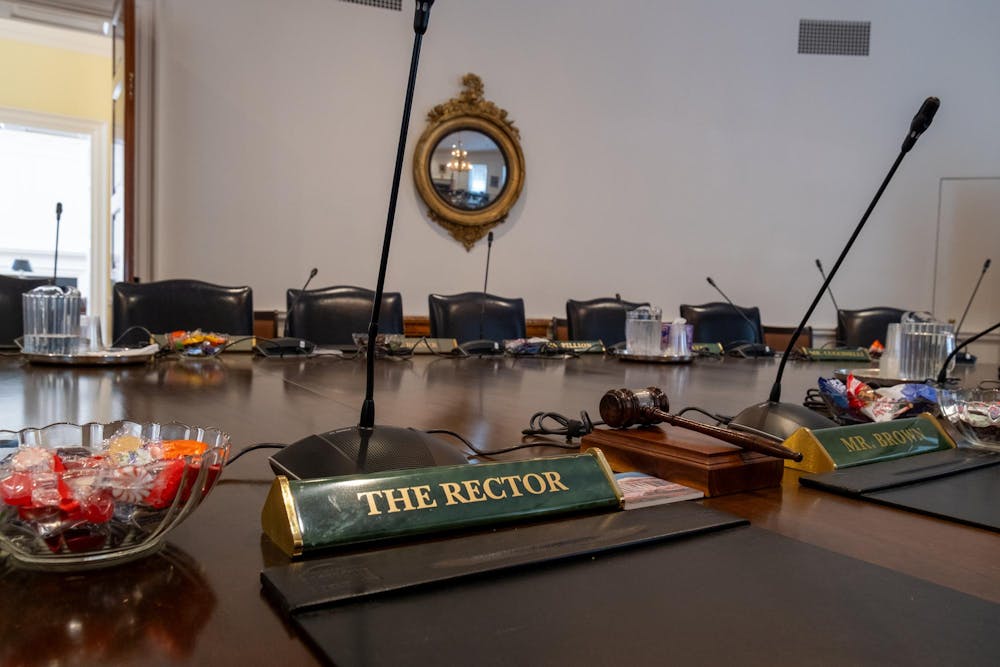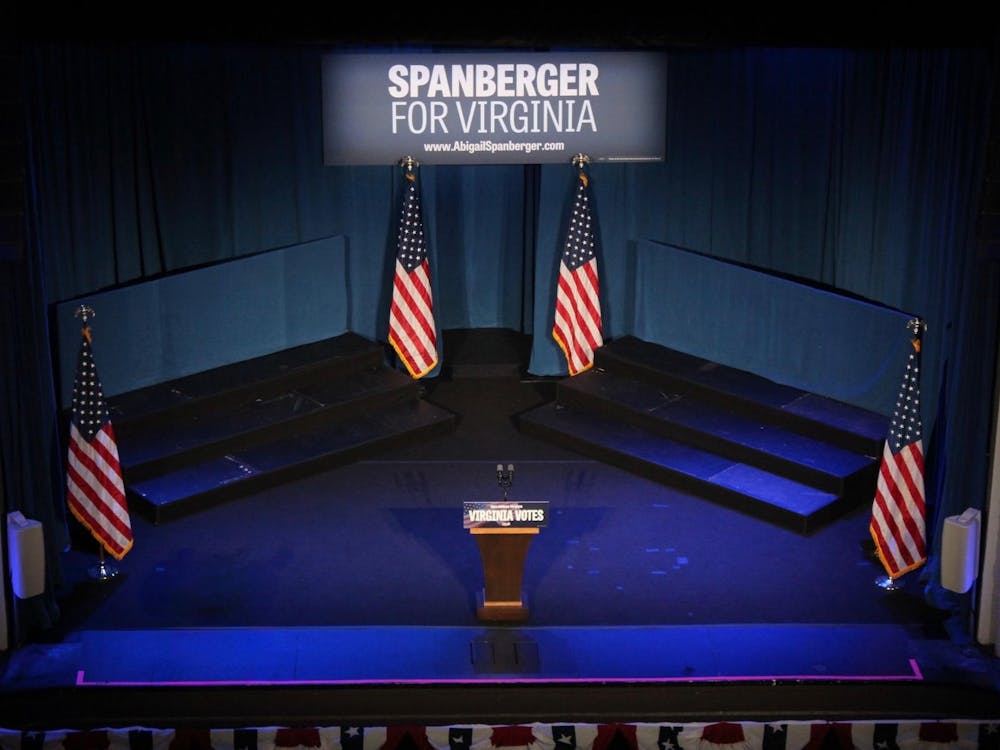The full Board of Visitors met Friday to discuss the state of federal funding for research at the University and the administration’s efforts to promote viewpoint diversity. The Board also elected Rachel Sheridan as Rector and Porter Wilkinson as Vice Rector — both will serve terms of two years beginning July 1.
Vice President for Research Lori McMahon provided an update to the Board on research funding at the University, given cuts to federal funding which have occurred at the University and at universities across the country. According to McMahon, 78 percent of funds for sponsored research at the University come from federal sources. Of this federal funding, 51 percent of grants come from the National Institute of Health.
McMahon reported that as of Friday, 44 research grants, totaling around $64 million, from the federal government have been terminated — the largest number of these terminated grants were from the National Science Foundation, the National Endowment of Arts and Humanities and the National Institute of Health. However, she noted that the University is in a better position than its peer institutions.
“We have had fewer grants canceled than most of our peers, so that's something to be celebrated,” McMahon said. “I will say that with all of these challenges that we're facing, I remain optimistic because of the talent, the drive, the energy, the resilience of our faculty … who have not stopped their hard work.”
University President Jim Ryan also invited Brie Gertler, interim executive vice president and provost, to present to the Board on efforts to promote viewpoint diversity, which he defined as the practice of ensuring all community members are able to express politically diverse views and engage in constructive discussion.
This presentation followed a special Board meeting in April, during which members passed a resolution which built on its March decision to dissolve the Office of Diversity, Equity and Inclusion and asked that administrators make additional efforts to advance viewpoint diversity as well as report to the Board at this meeting on these efforts.
During her presentation, Gertler reported that the University ranked number one among 250 institutions in the 2025 College Free Speech Rankings Report, which is based on student surveys and analyses of institutional policies and practices. She also reported that in the University’s annual Student Experience in a Research University survey, a strong majority — around 80 percent — of students said that they often interacted with someone whose views differed from their own.
Gertler asked members to discuss whether the University should make efforts to have faculty with a broad range of political and social views and who teach their own views to students, or whether faculty should instead avoid teaching students their personal views but equip students with the tools to form opinions independently.
“I'm being a little strategic here,” Gertler said. “I think that there are some movements to say that we should hire some liberal faculty members, we should hire some conservative faculty members and then [students] go to each class to get each view. And I'm sort of pushing [against] that a little bit to ask, is that really the model that we want to have, or do we want to have a model where faculty understand that their role is to expose students to the full range of accepted positions on a topic.”
Board member Doug Wetmore did not specifically comment on Gertler’s question about the content of classes, but argued that the University should employ a larger number of conservative faculty members.
“I think you need to have a faculty that attempts to be balanced,” Wetmore said. “There's an organization that looks at political donations made by employers and at the University, political donations were 95 percent Democrat, 5 percent Republican … I think there's a view among some … that there's not a purposeful effort to try to balance the faculty from a philosophical and political point of view.”
According to OpenSecrets, 93 percent of political donations to federal candidates from employees at the University were to Democratic candidates, while 7 percent were to Republican candidates. In contrast, of the 17 members of the Board, three have donated to Democratic candidates and 12 have donated to Republican candidates. The donations of two members are not available on OpenSecrets.
During the portion of the meeting in which they addressed action items, newest Board member Ken Cuccinelli brought a proposed amendment to the Board which would alter the selection process for Secretary of the Board, whose central duties include recording all meeting minutes and preserving official Board documents.
Currently, the University President nominates a candidate for Secretary with concurrence of the Rector — Cuccinelli’s original proposal would remove the concurrence of the Rector and permit nominations from any member of the Board. While introducing the amendment, Rector Robert Hardie noted that the Secretary is under immediate direction from the president and shared that all seven members of the Board’s Executive Committee had reviewed and opposed the changes proposed by Cuccinelli.
However, at the meeting Cuccinelli passed around a substitute amendment which he said would allow the Secretary to be nominated by the Rector and work exclusively for the Board, rather than reporting to Ryan. Several members asked Hardie why the Executive Committee had objected to the original proposal, and what they thought of the new proposal — Hardie shared that he also objected to the new proposal but could not speak for the Executive Committee. Vice Rector Carlos Brown agreed, arguing that making the Secretary answer solely to the Board would create inefficiencies in coordination efforts with University administration.
After continued deliberation on the selection process and reporting structure of the Secretary’s position, the Board voted unanimously to defer the amendment to its September meeting.
Following the Board’s closed session, they approved the election of Rachel Sheridan as the next Rector and Porter Wilkinson as the next Vice Rector. Both will begin their terms July 1 as Hardie and Brown prepare to step down from their positions, and will serve until June 30, 2027. The Board also voted to approve motions passed in individual Committee meetings, including the fiscal year 2025-2026 operating budget — which will total around $6.5 billion, the 2025 Major Capital Plan totaling around $1.85 billion and the internal audit plan for fiscal years 2026 and 2027.
The Board approved most of these motions in a joint voice vote, but members asked that the budget approval be separated and that each member vote individually. Prior to the vote, Jennifer Wagner Davis, executive vice president and chief operating officer, emphasized the importance of the budget to the University’s rankings and asked that members be thoughtful about their votes. The University’s proposed budget passed, but Cuccinelli, Wetmore, Paul Harris and Stephen Long voted against the approval. Because of time constraints, there was not time for discussion about the budget.
Board member Dan Brody gave a memorial resolution for former University President John Casteen III, who passed March 18. Michael Kennedy received a commending resolution for his work as Faculty Representative to the Board throughout the past year, and the Board heard an update on the work of the Faculty Senate from current Chair Jim Lambert, who will serve as Faculty Representative to the Board over the next year. He noted that the Senate has worked to collaborate with student leaders and members of the Staff Senate, General Faculty Council, Academic General Faculty and the American Association of University Professors.
Gregory Perryman, student representative to the Board and fourth-year College student, spoke about his priorities — which include connection, student self-governance, affordability and taking advantage of emerging opportunities — at his first meeting with the full Board.
“What ties all of these [priorities] together is the importance of keeping students at the center of every decision this Board makes,” Perryman said. “Doing so not only improves our outcomes, it builds a trust between students and the Board that sustains the connectedness that makes this University so special.”
The Board spent around one hour in closed session to consult with legal counsel, to consider faculty appointments, promotions, performance and resignations and to conduct its annual evaluation of Ryan.
The full Board will reconvene Sept. 12 at its next regularly scheduled meeting.







